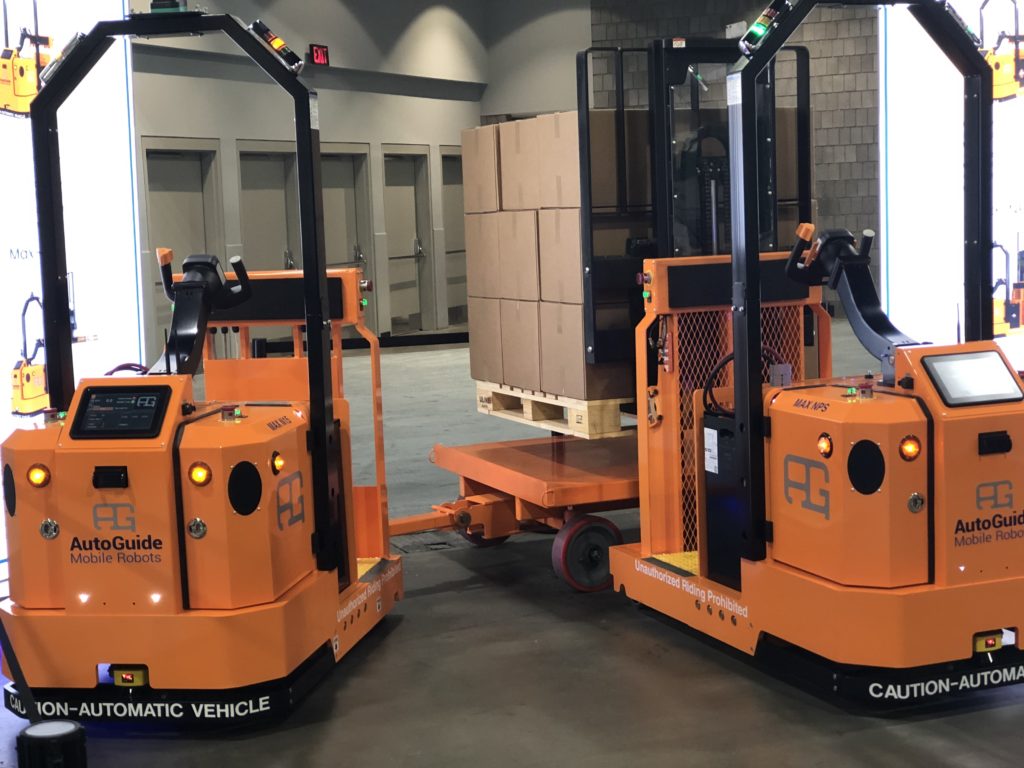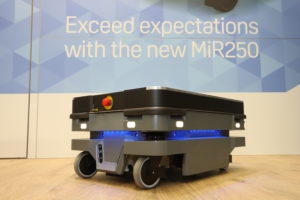
ATLANTA – Robotics companies were among those making news announcements during the opening of the MODEX intralogistics show, where more than 30,000 people were expected to see the latest in materials handling technologies. Companies looking to add collaborative mobile robots to their workflows could witness either new products from these companies, or they could hear about new partnerships and customer announcements to help them along their deployment path.
Here is a roundup of news announcements of note from the first day:
New robots, accessories
Mobile Industrial Robots (MiR) launched the MiR250, a collaborative autonomous mobile robot (AMR) that the company says is faster, safer and more agile than any other solution in the category. The lower and narrower MiR250, which can travel up to 7.2 km per hour, is designed to move smoothly and navigate through limited spaces such as door openings, small elevators, and under tables.

“The more agile robots are, the more useful they become, especially in existing environments with tight spaces,” said Thomas Visti, CEO of MiR. “We are seeing huge demand from current and prospective customers for robots that can quickly and smoothly navigate through tight industrial environments such as door openings as small as 80 cm. The MiR250 is the answer.”
Visti added that the robot can be charged twice as quickly as other small-sized mobile robots, providing an extra three hours of operation in a 24-hour period. The company said users that don’t want any downtime at all can swap out batteries in about two minutes. You can read more about these robots here.
Denmark-based ROEQ, which develops accessories for MiR’s collaborative robots, showcased three new products aimed to work with the MiR250 robot. The ROEQ Shelf Carrier Extended, ROEQ Adapter 250 and the ROEW Shelf-Cart 300 were announced at the show.
“The timing of our launches is a testament to our commitment and emphasizes our ability to further strengthen our position as the leading provider of customized accessories for MiR’s flexible robots,” said Michael Ejstrup Hansen, CEO of ROEQ.

The Shelf-Cart 300 vehicle can carry up to 300 kg (661 lbs) that the MiR250 can pick up and deliver anywhere in the workplace, even without a docking station. Customers with existing ROEQ top modules for other MiR robots can still use them with the MiR250 through the ROEQ Adapter Module 250. The Shelf Carrier 300 Extended is an extended top module specifically designed for the MiR250, making it long enough to carry things such as Euro pallets without compromising safety, ROEQ said. “Our new products may seem relatively simple at first glance, but ensuring an intuitive user experience has required significant R&D efforts,” said Hansen.
AutoGuide Mobile Robots launched the Max-N15 (see photo, above), a high payload modular AMR tugger capable of transporting up to 15,000 pounds. Built on the company’s modular design, the Max-N15 provides a common base that can be adapted for multiple manufacturing and warehouse material handling tasks with modular attachments to create lift trucks, tuggers or high bay pallet lift trucks.
“With the Max-N15, companies needing to pull heavy payloads can safely and easily do so with autonomous robotics greatly improving operational safety and enabling valuable labor resources to be utilized for higher value tasks,” said Rob Sullivan, president and CEO of AutoGuide Mobile Robots. “In fact, customers can transform one vehicle or a fleet of vehicles to accommodate their ever-changing work environment. The fork truck you’re using today can easily be transformed into a tugger tomorrow, and then back again the next day.”
The Max-N15 extends the company’s offerings, which also includes the Max-N10 tugger, Max-N10 pallet stacker and SurePath fleet management software. “The Max-N15 modular architecture lets customers evaluate new attachment designs with low costs, choosing the ones that work best for any given need,” said Sullivan. “Like our lower-payload robots, the Max-N15 is not a retrofit kit. We manufacture our robots from the ground up, designed to be an AMR from the first piece of steel to the last screw. This ensures our customers are getting the safest, fastest and most robust high-payload AMR available.”
Partnerships and collaborations
Several companies announced partnerships at the show today, including:
- Fetch Robotics and Zebra Technologies teaming up to integrate fulfillment processes through AMRs and software (read more here).
- Packsize and 6 River Systems announced an integration of the Packsize iQ3 packaging solution with 6 River’s collaborative mobile robot “Chuck”. Through integration of a company’s warehouse management system, right-sized cartons can be created and paired with Chuck to help operators minimize walking while ensuring a sustainable box for every order, the companies said in a statement (read more here).
- Körber Supply Chain, which last week held its Elevate conference for warehouse and supply chain companies, announced a strategic partnership with Twinlode Automation, an integrator of warehouse automation and storage systems. The two companies will plan, engineer and deliver supply chain solutions “from beginning to end”, giving customers a single source to streamline workflows and processes to enhance productivity and increase throughput at a lower total cost of ownership (read more here).
- Brain Corp announced partnering with UniCarriers Americas Corporation to develop autonomous delivery robots for use in retail, warehouses, airports and other dynamic environments. UCA, which also recently expanded its partnership with Vecna Robotics, will license Brain’s BrainOS cloud-connected operating system to manufacture delivery robots that can navigate safely and autonomously in public and commercial spaces. UCA said it will initially develop the robots for a large retailer that will use the AMRs to expedite labor-intensive shelf restocking within stores (read more here).
- Brain also announced a partnership with Dane Technologies to manufacture autonomous material delivery robots for use in public and commercial applications. Under the partnership, Dane will license BrainOS to begin building delivery robots in Q2 2020, with pilot programs expected with several major retailers during the spring. The robots can operate across several indoor public spaces, enabling seamless transportation and delivery of goods from point to point. The robots enable workers to avoid pushing several hundred pounds of inventory from the back of a store to in-store displays, in the goal of increasing efficiency, lowering workers’ compensation-related injuries, and freeing up time for employees to serve customers (read more here).
- inVia Robotics announced that Ecentria has deployed inVia’s robotics-as-a-service system to automate order fulfillment in a distribution center in Aurora, Ill. The fleet of AMRs and AI-driven software is now live in the primary distribution center supporting online retailer OpticsPlanet, an Ecentria company. The site provides customers a wide selection of sport optics, tactical and military gear, scientific products, hunting gear, professional-grade products and eyewear. Customers include individual consumers as well as local law enforcement and U.S. government agencies (read more here).
We will provide updates from MODEX as companies continue to make announcements during the week.




